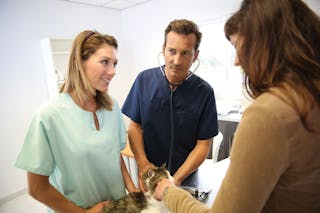
Being a good vet (Part 1)
“If your only tool is a hammer, all problems resemble a nail”. This section will stress the different factors required to make you a “good clinician”
MBA
Mark Moran has been a consultant to the veterinary profession for the last 19 years, providing business mentoring and support for veterinary clinic owners and key staff. His work involves helping veterinary practices create effective working environments, with happy staff, that meet the business owner’s values and expectations. He has a special interest in helping practices to improve their patient’s compliance to veterinary recommendations by making better use of data systems.
เปิดหัวข้อและประเด็นที่อภิปรายโดยนักเขียนนี้ด้านล่าง

“If your only tool is a hammer, all problems resemble a nail”. This section will stress the different factors required to make you a “good clinician”

Most veterinarians are not comfortable when discussing fees, or when asked to "sell" something, but this is normal! This chapter offers a method which will allow you to prescribe or recommend products and services effectively.

It’s never too early to think about the future. For many young veterinary surgeons, their job is primarily the result of a passion for pets.

Understanding the various factors involved that contribute to the income and expenditure of a veterinary clinic is key for long-term success.

This part will cover the art of communication, especially when dealing with pet owners, because nothing is more frustrating than a lack of compliance when treating an animal.

Once you've accepted a post at a practice, you'll need to learn how to manage people. You'll also need to take care of yourself to avoid burn-out. This chapter tells you how.

Even the most skilful surgeon or physician needs a good team to succeed, and as a recent graduate you will certainly want others to help and support you.

In many countries there is currently a dearth of veterinary surgeons, and you may have various employment options once you graduate.
